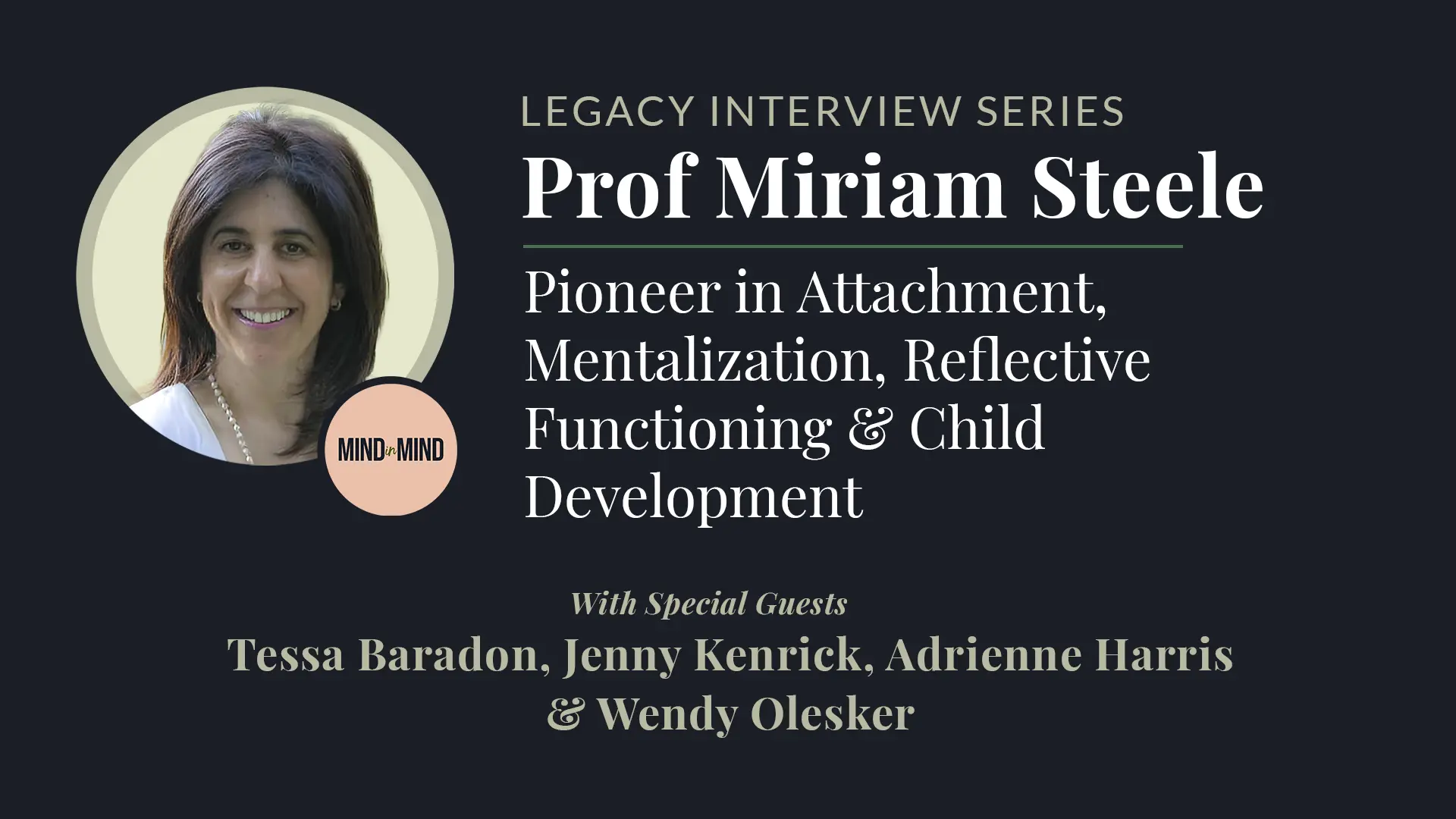June 2025
Stephen Porges and Sue Carter Live Legacy Interview
Stephen Porges and Sue Carter Live Legacy Interview
Join us for a special Live Legacy Interview exploring the life and work of Dr Stephen Porg...

– Watch the full recording for FREE includes a 2 hour CEU/CPD certificate –
“This is very inspiring work, and it leaves us with many ideas to consider in our own practice.”
“It is igniting an individual’s curiosity about the contents of their own mind and the mind of the other, that’s the goal. That’s what we’re trying to do.”
This Legacy Interview offers a rare opportunity to learn from one of the world’s leading researchers and thinkers in child mental health. For over three decades, Professor Miriam Steele has been at the forefront of attachment research, developing groundbreaking concepts and methodologies that have transformed our understanding of parent-child relationships and developmental trajectories.
The conversation explores Miriam’s thinking from her early PhD studies at the Anna Freud Centre to her current role as Professor of Psychology and Director of Clinical Psychology at The New School for Social Research in New York, where she co-directs the Center for Attachment Research with her husband, Howard Steele.
Of particular significance is Miriam’s development of the concept of parental reflective functioning—a parent’s capacity to understand their children’s emotions as well as their own. This concept, which emerged from her early research, was groundbreaking and has significantly influenced child psychotherapy models and underpins modern mentalization-based treatments. She says, “Even individuals who faced tremendous adversity in their childhoods, who had this capacity to reflect on their experiences in childhood and earn their security, did not then pass along their insecurity.”
The interview explores with Miriam how reflective functioning became a central theme in her work and why it has proven so crucial in understanding children’s attachment patterns and developmental outcomes.
Miriam discusses how reflective functioning became a central theme in her work and why it has proven so crucial in understanding children’s attachment patterns and developmental outcomes.
She shares insights from her extensive research in adoption and foster care, offering evidence-based hope for severely maltreated children, and discusses the policy and treatment implications of her findings. She says, “There is no more powerful intervention we have access to, than adoption, than letting a child know this is your permanent family.”
She discusses her innovative Group Attachment Based Intervention (GABI) for vulnerable families in the Bronx, New York, demonstrating how psychodynamic practice can be effectively integrated into community settings.
Miriam also calls us to action, saying “We know enough. We don’t need any more research on the importance of attachment for children. That’s been well demonstrated. Why aren’t we doing anything about it?”
Tessa Baradon shares insights from her long collaboration with Miriam at the Anna Freud Centre, discussing how Miriam’s work has profoundly influenced parent-infant psychotherapy. She reflects on their joint paper about the clinical use of the Adult Attachment Interview in parent-infant work and describes how Miriam’s persuasive advocacy for research-based approaches has enhanced clinical practice.
Jenny Kenrick discusses her work with Miriam in the field of adoption and fostering, highlighting how their collaboration transcended traditional institutional boundaries between the Tavistock Clinic and Anna Freud Centre. She explains how Miriam’s research has provided crucial evidence for understanding the needs of children who have experienced trauma leading to care placements, emphasising the importance of supporting parents with unresolved trauma.
Wendy Olesker reflects on her longitudinal research with the Margaret Mahler projects, following children from nursery to adulthood, and discusses the parallels with Miriam’s work. She explores how psychoanalytic understanding of development has been enriched by Miriam’s attachment research, creating a more integrated approach to understanding children’s internal worlds.
Adrienne Harris discusses her shared journey with Miriam from developmental psychology to psychoanalytic practice. She explores how their work together at the New School has fostered important conversations between different theoretical traditions and reflects on how Miriam’s commitment to empirical research has strengthened psychoanalytic approaches to understanding development.
 Professor Miriam Steele is a pioneering figure in attachment research, reflective functioning, and child development. As Professor of Psychology at The New School for Social Research, she co-directs the Center for Attachment Research with her husband, Howard Steele. Her transformative work has shaped modern mentalization-based treatments and influenced clinical practices across the globe. From her groundbreaking research in adoption and foster care to her innovative Group Attachment Based Intervention (GABI) in the Bronx, Miriam’s contributions have redefined how we understand and support vulnerable children and families.
Professor Miriam Steele is a pioneering figure in attachment research, reflective functioning, and child development. As Professor of Psychology at The New School for Social Research, she co-directs the Center for Attachment Research with her husband, Howard Steele. Her transformative work has shaped modern mentalization-based treatments and influenced clinical practices across the globe. From her groundbreaking research in adoption and foster care to her innovative Group Attachment Based Intervention (GABI) in the Bronx, Miriam’s contributions have redefined how we understand and support vulnerable children and families.
Her work represents an important bridge between psychoanalytic thinking and empirical research, constantly testing and refining theoretical concepts through careful observation and measurement. Her collaborative research with Howard Steele has resulted in numerous influential papers and books that have shaped the field of developmental psychology and child mental health.
 Child Psychotherapist and former Director of the Parent-Infant Project at the Anna Freud Centre. Tessa has worked in various clinical settings, helping parents and infants navigate emotional difficulties. She has collaborated closely with Miriam Steele to integrate attachment concepts into parent-infant psychotherapy.
Child Psychotherapist and former Director of the Parent-Infant Project at the Anna Freud Centre. Tessa has worked in various clinical settings, helping parents and infants navigate emotional difficulties. She has collaborated closely with Miriam Steele to integrate attachment concepts into parent-infant psychotherapy.
 Consultant Child and Adolescent Psychotherapist and expert on adoption and fostering. Jenny has worked extensively with children in transition within foster care and adoption contexts, providing crucial clinical insights that complement Miriam Steele’s research.
Consultant Child and Adolescent Psychotherapist and expert on adoption and fostering. Jenny has worked extensively with children in transition within foster care and adoption contexts, providing crucial clinical insights that complement Miriam Steele’s research.
 Psychoanalyst and Developmental Psychologist, Faculty at New York University Postdoctoral Program in Psychotherapy and Psychoanalysis. Adrienne combines her early training in developmental psychology with a psychoanalytic approach, creating innovative insights into child development.
Psychoanalyst and Developmental Psychologist, Faculty at New York University Postdoctoral Program in Psychotherapy and Psychoanalysis. Adrienne combines her early training in developmental psychology with a psychoanalytic approach, creating innovative insights into child development.
 Training & Supervising Analyst at the New York Psychoanalytic Institute and Faculty at NYU Postdoctoral Program in Psychoanalysis and Psychotherapy. Wendy’s research on child development, particularly through longitudinal studies, aligns closely with Miriam’s work on attachment theory.
Training & Supervising Analyst at the New York Psychoanalytic Institute and Faculty at NYU Postdoctoral Program in Psychoanalysis and Psychotherapy. Wendy’s research on child development, particularly through longitudinal studies, aligns closely with Miriam’s work on attachment theory.
Miriam was in conversation with Jane O’Rourke and Salam Soliman.
Jane O'Rourke – Founder of MINDinMIND and former award-winning BBC journalist turned Child and Adolescent Psychotherapist. Jane brings a unique skill set to create rich and thoughtful conversations, weaving together the personal and professional threads of her guests' journeys.
Salam Soliman – Director of the Center for Prevention and Early Trauma Treatment at Child First, Board Member of APA Division 39, and a Board Member of MINDinMIND.
Details correct as of 27 February 2025
Join us in exploring Professor Miriam Steele’s groundbreaking work—watch the full Legacy Interview now and discover how her research continues to shape the future of child mental health.
– Watch the full recording for FREE includes a 2 hour CEU/CPD certificate –
Select Publications